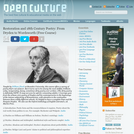
When John Locke declared (in the 1690 Essay Concerning Human Understanding) that knowledge was derived solely from experience, he raised the possibility that human understanding and identity were not the products of God's will or of immutable laws of nature so much as of one's personal history and background. If on the one hand Locke's theory led some to pronounce that individuals could determine the course of their own lives, however, the idea that we are the products of our experience just as readily supported the conviction that we are nothing more than machines acting out lives whose destinies we do not control. This course will track the formulation of that problem, and a variety of responses to it, in the literature of the "long eighteenth century." Readings will range widely across genre, from lyric poetry and the novel to diary entries, philosophical prose, and political essays, including texts by Alexander Pope, Jonathan Swift, Mary Astell, David Hume, Laurence Sterne, Olaudah Equiano, Mary Hays, and Mary Shelley. Topics to be discussed include the construction of gender identities; the individual in society; imagination and the poet's work. There will be two essays, one 5-6 pages and one 8-10 pages in length, and required presentations.
- Subject:
- Arts and Humanities
- History
- Literature
- Philosophy
- World History
- Material Type:
- Full Course
- Provider:
- MIT
- Provider Set:
- MIT OpenCourseWare
- Author:
- Jackson, Noel
- Date Added:
- 02/01/2003
